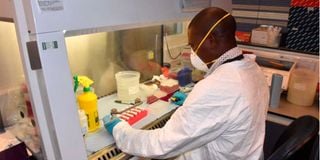Kemri launches diagnostic kits for malaria and Covid-19

A Kemri staff at their lab in Kilifi County on May 21.
The Kenya Medical Research Institute (Kemri) has introduced two locally made test kits for malaria and Covid-19.
The products, launched yesterday at the start of a three-day annual scientific and health conference in Nairobi, have received approval from the Pharmacy and Poisons Board, making them ready to hit pharmaceutical shops.
The malaria rapid diagnostic kit is called Plasmocheck and the Covid-19 one KEMCoV-19. The innovations are among the latest diagnostic tools from Kemri
The tools will help in diagnostics and disease detection, said Health Chief Administrative Secretary Dr Rashid Aman when he launched the products.
Kemri scientists said the malaria kit has a turnaround time of 30 minutes and can be used by untrained or minimally skilled personnel without laboratory equipment.
“Both test kits are 100 per cent sensitive and specific, meaning that the test kits can detect a true positive and true negative,” explained Dr Damaris Matoke-Muhia, deputy director for the Biotechnology Research Programme at Kemri.
Whereas the market rate for malaria tests is Sh300 per test, Kemri’s Plasmocheck will cost Sh60.
The Covid-19 test will cost Sh1,600, while public health centres charge Sh2,600 and private ones between Sh5,000 and Sh11,000.
“We estimate that these kits will save the country about Sh58 million on malaria testing and Sh405 million on Covid-19 testing annually,” said Dr Cecilia Wanjala, Kemri commercial manager.
Kemri developed its first malaria rapid diagnostic kit in July last year. It was commissioned by President
Uhuru Kenyatta at the Kemri-Wellcome Trust Research Programme in Kilifi County.
Because of increasing Covid-19 cases globally in 2020, there were supply chain challenges in laboratory testing kits, reagents and supplies. As such, that year Kenya adopted the use of rapid antigen tests in addition to PCR tests.
But the country still has not achieved optimum testing as most of the detection has focused on people reporting at health facilities with symptoms and those arriving or departing airports.
This has led to large-scale under-reporting, given the high percentage of asymptomatic cases in Africa.
“Although we have carried out more than three million tests, we have not reached the WHO (World Health Organization) recommended testing threshold of one per cent of the population,” Dr Aman said.
In October the WHO warned that six in seven Covid-19 infections go undetected in Africa.
“With limited testing, we’re still flying blind in far too many communities in Africa. Most tests are carried out on people with symptoms, but much of the transmission is driven by asymptomatic people, so what we see could just be the tip of the iceberg,” Dr Matshidiso Moeti, WHO regional director for Africa, said at the time.
“Test numbers have been rising in Africa, but this community-based initiative is a radically new approach which should help significantly raise detection rates. More testing means rapid isolation, less transmission and more lives saved through targeted action.”





